Navigating the complexities of mortgage points and costs
Understanding how mortgage points function and their impact on your loan can significantly influence your financial planning. Whether you're considering buying points to reduce your interest rate or want to understand the long-term cost implications, a clear knowledge of these fees is essential for making informed decisions about your mortgage. This article explores what mortgage points are, how they affect your interest rate and payments, their potential savings and costs, and critical considerations to determine whether paying points aligns with your financial goals.
What Are Mortgage Points and How Do They Function?
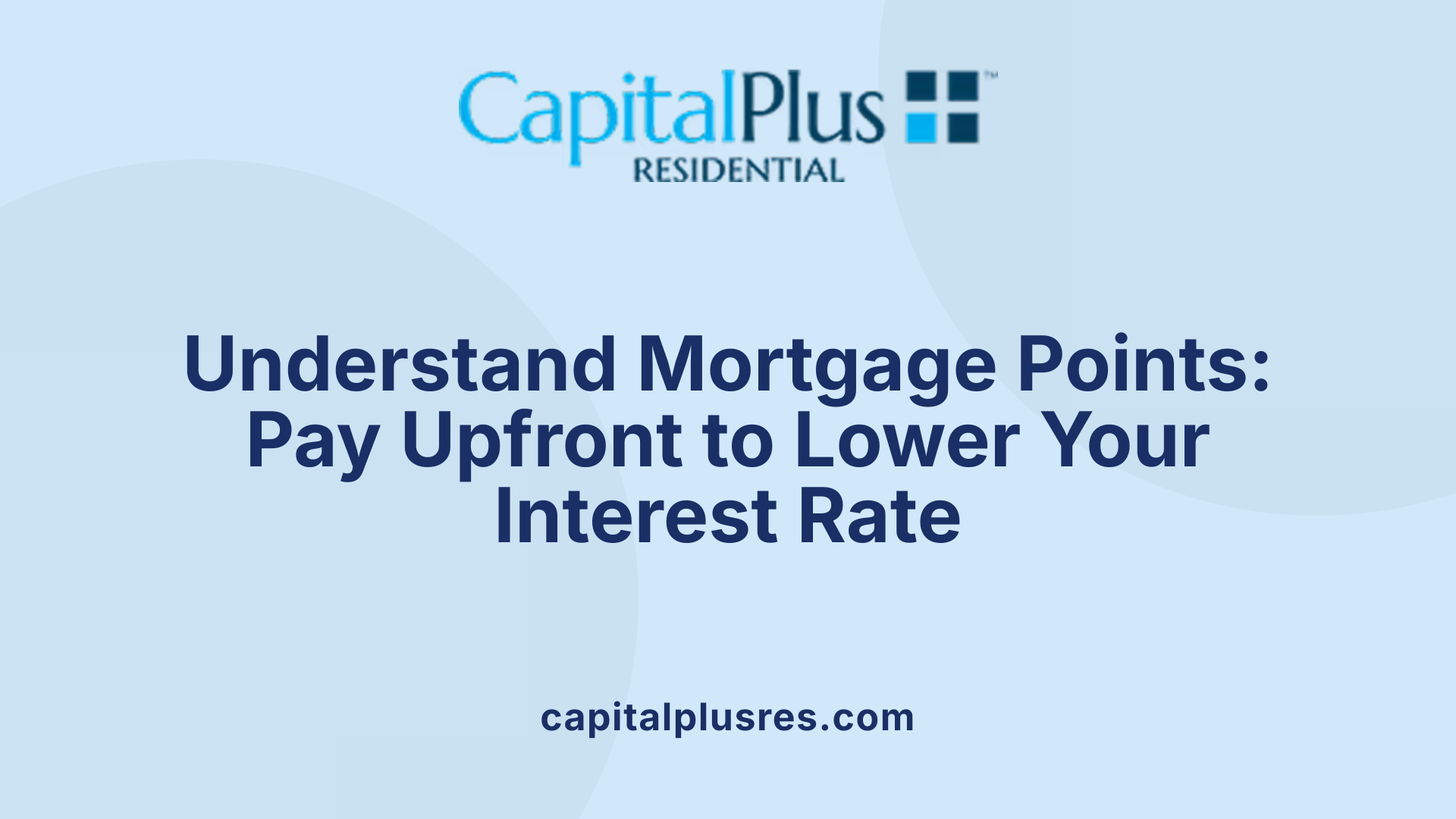
What are mortgage points and how do they function in a mortgage agreement?
Mortgage points, also known as discount points, are fees paid upfront at closing to lower the interest rate on a mortgage. Typically, one point equals 1% of the total loan amount. For example, on a $200,000 mortgage, one point would cost $2,000.
When a borrower pays these points, the lender reduces the interest rate on the loan by approximately 0.25%. This reduction results in lower monthly payments and helps the borrower save on interest costs over the loan's lifespan.
The main purpose of paying points is to 'buy down' the mortgage rate. This means paying in advance to receive a more favorable interest rate, which can be especially beneficial for those who plan to stay in their home for many years.
Deciding whether to purchase points involves considering the break-even point—the time it takes for the interest savings to offset the initial cost. If a borrower expects to own the home beyond this point, buying points could be a smart financial move.
It’s important to distinguish mortgage points from origination fees. Origination fees are paid for processing and origin of the loan but do not influence the interest rate. Mortgage points directly reduce the rate, leading to lower payments over time.
Overall, mortgage points offer a way to customize your loan, balancing upfront costs against long-term savings, especially if you plan to hold the mortgage for many years.
How Do Mortgage Points Influence Interest Rates and Monthly Payments?
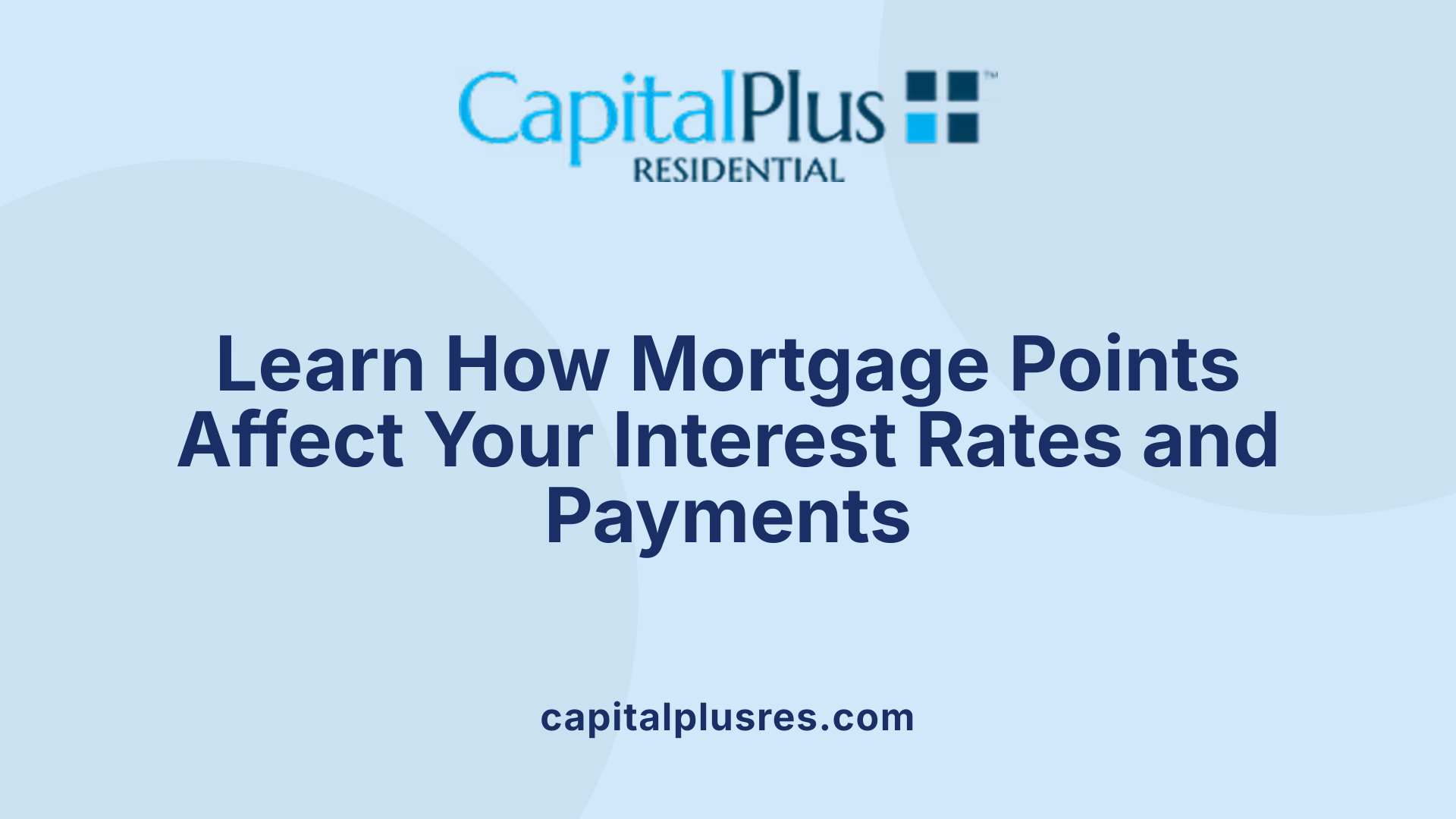 Mortgage points areFees paid upfront—each typically costing 1% of the loan amount—to reduce the mortgage's interest rate. Paying points can lower your interest rate by approximately 0.25% per point, which in turn decreases your monthly mortgage payments.
Mortgage points areFees paid upfront—each typically costing 1% of the loan amount—to reduce the mortgage's interest rate. Paying points can lower your interest rate by approximately 0.25% per point, which in turn decreases your monthly mortgage payments.
The amount of reduction depends on the number of points purchased and the specific terms offered by the lender. Generally, buying more points results in a greater interest rate decrease but also increases the initial cost at closing.
This lower interest rate benefits the borrower particularly over a longer period of ownership. By reducing interest costs, mortgage points lead to smaller monthly payments, making homeownership more affordable over time.
The impact on the total interest paid throughout the life of the loan can be significant. With a lower rate, borrowers pay less interest overall, which can save thousands of dollars.
However, the advantage depends heavily on how long the homeowner plans to stay in the house. The 'break-even' point is the time when the savings from lower payments offset the cost of buying points.
If a borrower sells or refinances before reaching that point, they may not fully recover the upfront costs, reducing the financial benefit.
In summary, mortgage points are an effective tool to lower interest rates and monthly payments for long-term borrowers. Deciding to buy points should factor in your expected time in the home and financial goals.
Calculating and Evaluating the Cost-Effectiveness of Mortgage Points
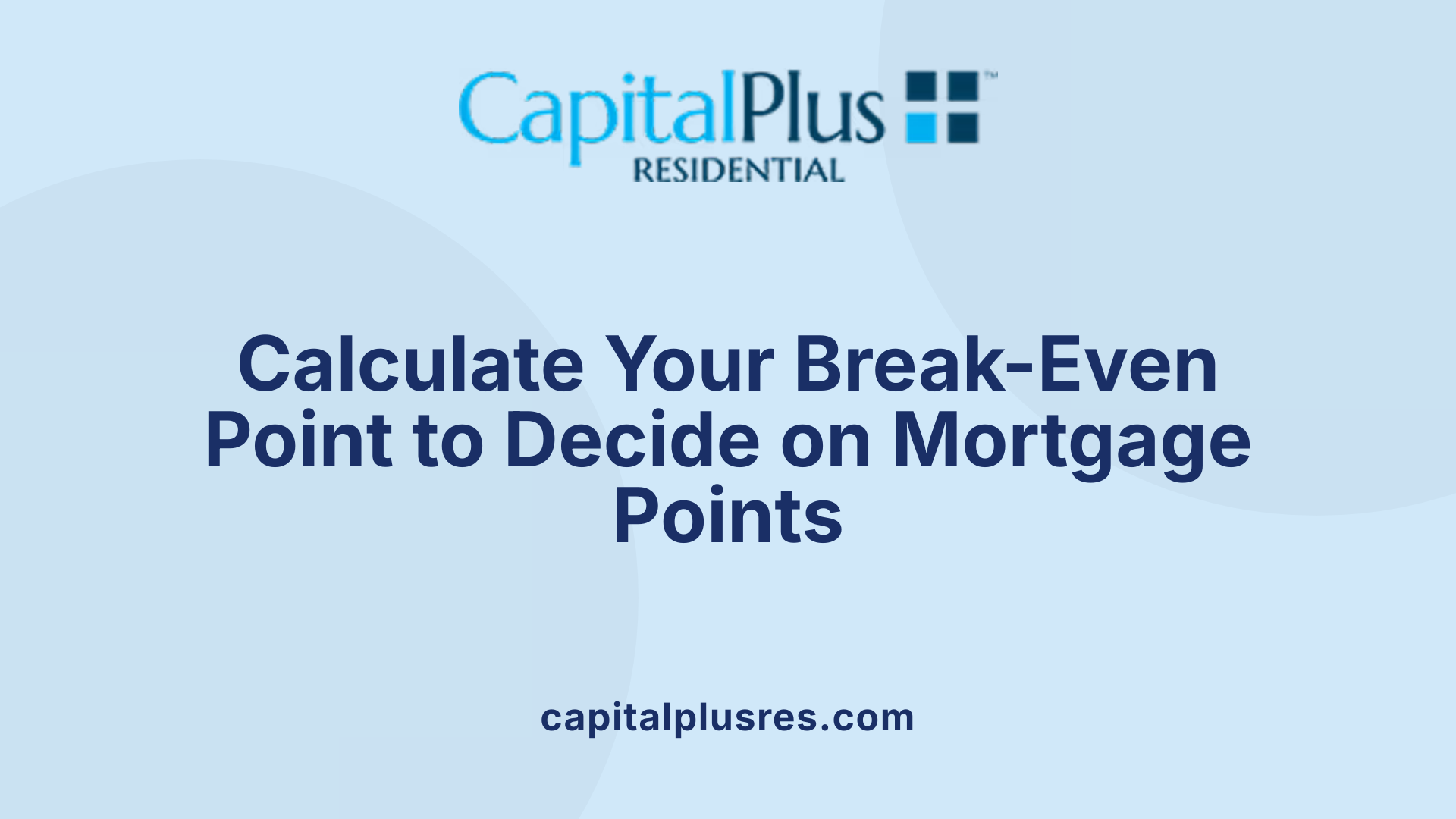
How can I calculate whether paying mortgage points is cost-effective for me?
To assess if paying mortgage points makes financial sense, you need to compare the initial expense with the savings it creates over time.
First, determine the total cost of the points you plan to buy. Since one mortgage point equals 1% of the loan amount, multiply the loan amount by 0.01 per point. If you buy multiple points, multiply accordingly. For example, buying two points on a $200,000 loan costs $4,000.
Next, find out how much lower your monthly payments will be by paying these points. This involves calculating the difference in monthly mortgage payments with and without the points, which depends on how much the interest rate drops—often about 0.25% per point.
Once you know the monthly savings, divide the total upfront cost by this amount to get the 'break-even' period in months. For instance, if buying points costs $4,000 and saves you $50 a month, the break-even point is 80 months (or about 6 years and 8 months).
If you plan to stay in the home longer than this break-even period, purchasing points can save you money over the long term. Conversely, if you expect to move or refinance sooner, paying points might not be worthwhile.
By performing this calculation, you can make a more informed decision aligned with your future plans and financial situation.
| Step | Calculation Description | Example | Additional Notes |
|---|---|---|---|
| 1 | Calculate total initial cost of points | Loan amount x 0.01 x number of points | e.g., $200,000 x 0.01 x 2 = $4,000 |
| 2 | Determine monthly savings | Difference in monthly payments with and without points | Based on reduced interest rate |
| 3 | Find break-even point | Total cost / Monthly savings | e.g., $4,000 / $50 = 80 months |
Evaluating these numbers helps you decide whether buying points aligns with your long-term financial goals.
Factors to Consider When Deciding Whether to Pay Points
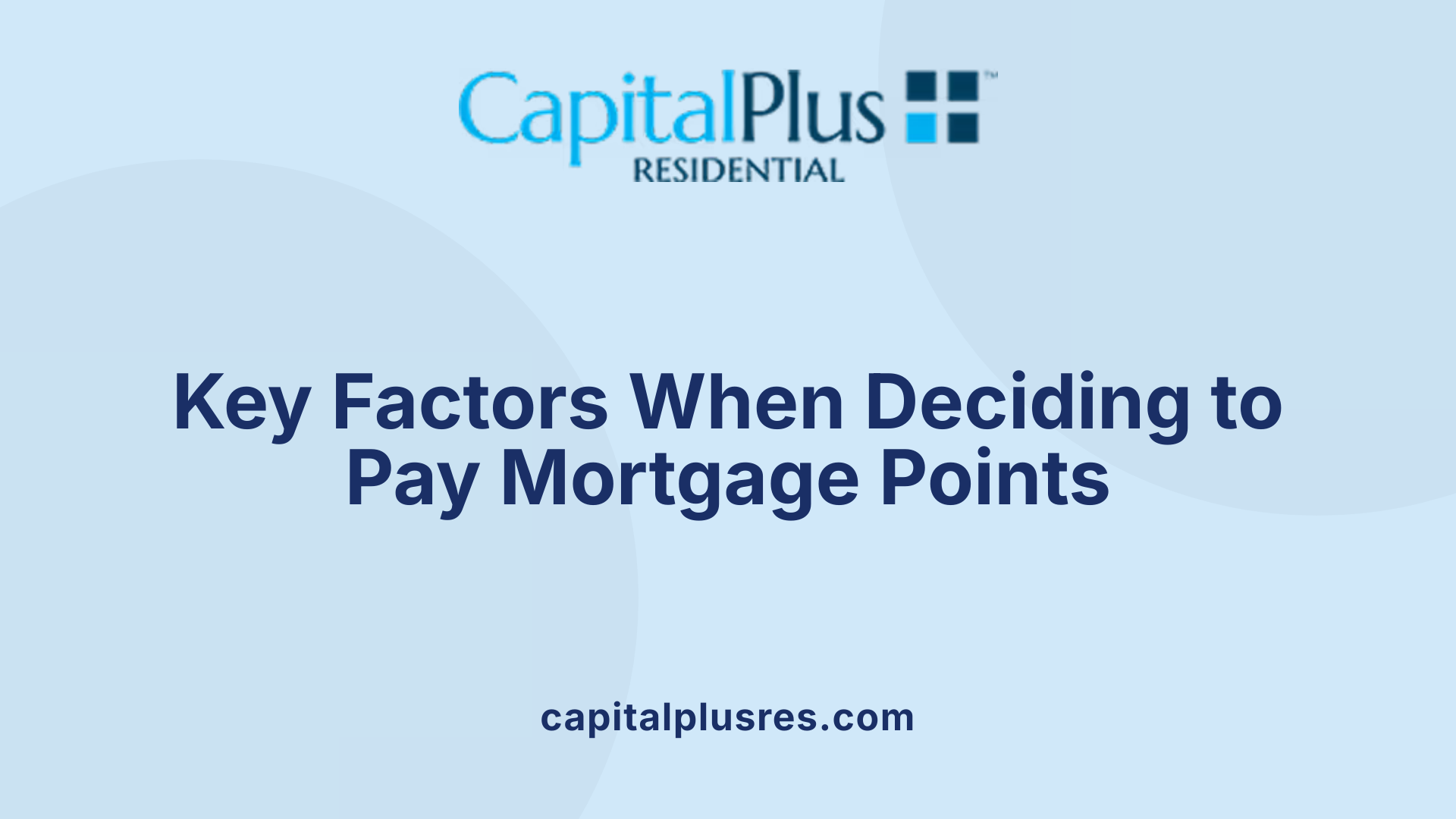
What factors should I consider when deciding whether to pay points on a mortgage?
Deciding whether to buy mortgage points is an important financial choice that depends on several personal and market factors. First, consider how long you intend to stay in your home. Paying points is usually more advantageous if you plan to keep the mortgage beyond the break-even point, which is typically around 5 to 7 years. The break-even point is when the savings from reduced monthly payments and interest offset the initial cost of purchasing points.
Your current financial situation is also crucial. Make sure you have enough cash available at closing to pay the upfront fee without compromising your other financial goals or emergency funds. If paying points strains your finances, it might be better to opt for a higher interest rate without points.
Next, think about your future plans. If you expect to refinance or sell the home before reaching the break-even time, buying points may not be cost-effective. Since you won't benefit from long-term interest savings, paying points could end up costing you more.
Tax implications are worth considering too. In some cases, mortgage interest paid on points can be deductible on your taxes if certain IRS conditions are met, especially for primary residences. This potential benefit can influence your decision.
In summary, evaluate your expected duration of homeownership, current cash flow, future refinancing or selling plans, and potential tax benefits. All these factors help determine whether paying points aligns with your long-term financial strategy.
| Factor | Consideration | Impact |
|---|---|---|
| Length of homeownership | Stay beyond the breakeven point to justify paying points | Lower payments offset initial costs over time |
| Financial situation | Ensure cash for upfront costs without strain | Avoid jeopardizing other financial priorities |
| Future refinancing or selling | Shorter stay may reduce profitability of paying points | May not recoup upfront costs if leaving early |
| Tax implications | Possible deduction if IRS criteria are met | Can reduce overall tax burden, influencing cost-effectiveness |
Researching and assessing these factors will guide you in making a well-informed decision about paying mortgage points.
Understanding the Overall Impact of Mortgage Points on Your Mortgage Costs
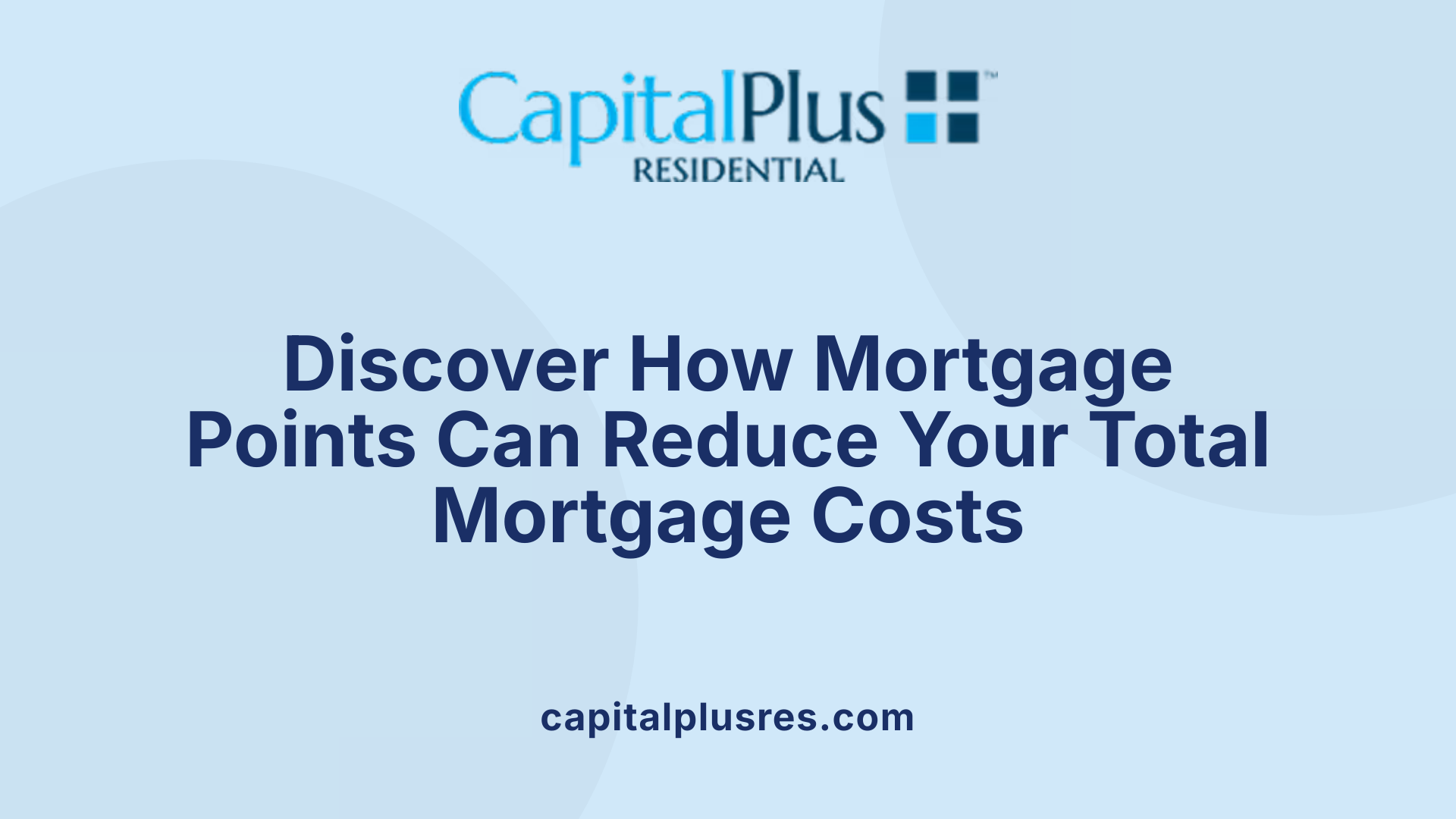
What is the relationship between mortgage points and the overall cost of a mortgage?
Mortgage points are fees paid upfront—usually 1% of the loan amount per point—that can lower the interest rate on your mortgage. By reducing the interest rate—often by about 0.25% per point—these points decrease your monthly payment and total interest paid over the life of the loan.
The overall impact of paying points greatly depends on how long you plan to keep the mortgage. If you maintain the loan beyond the break-even point, where the savings from lower interest rates offset the initial cost, paying points can lead to significant savings.
However, if you decide to sell, refinance, or move before reaching that break-even point, you may not recover the upfront expense, making paying points less advantageous.
Initial costs versus long-term savings
Paying for mortgage points results in higher upfront costs at closing. These costs will increase your initial cash expenditure but reduce your monthly payments and the total interest paid over the long term.
For instance, buying multiple points offers greater interest rate reductions but also costs more initially. The balance between these benefits and costs must be considered carefully.
If you plan to stay in your home for a long time, the savings in interest costs can outweigh the initial extra payment, making buying points a strategic financial move.
Importance of individual circumstances
Deciding whether to buy mortgage points depends on personal factors.
Your expected length of residence, cash availability, and future plans greatly influence the decision.
It’s wise to evaluate your personal situation and calculate the break-even point—how long it will take your savings to offset the initial cost.
Consulting with your lender for a detailed breakdown of costs and potential savings helps determine if paying points aligns with your financial goals.
Overall, understanding the tradeoffs between initial costs and long-term savings is essential when considering mortgage points, especially for those planning a long-term stay in their home.
Making Informed Decisions on Mortgage Points
Understanding the role of mortgage points enables borrowers to make smarter financial choices. Carefully assessing the cost versus the savings, considering personal plans for homeownership, and factoring in potential tax deductions can help determine whether purchasing points is advantageous. While points can lower monthly payments and increase long-term savings, their benefits are maximized when the holding period exceeds the break-even point. As with any significant financial decision, consulting with a mortgage advisor or financial planner can ensure that your approach aligns with your overall financial goals, making your mortgage work better for you.
References
- What are mortgage points and how do they work?
- How Mortgage Points Work
- What are Points and Fees, and How do They Affect ...
- What Are Mortgage Points?
- Topic no. 504, Home mortgage points
- How Do Mortgage Points Work?
- How should I use lender credits and points (also called ...
- What are mortgage points and how do they work?
- Everything You Need to Know About Mortgage Discount Points
- What Are Mortgage Points?









